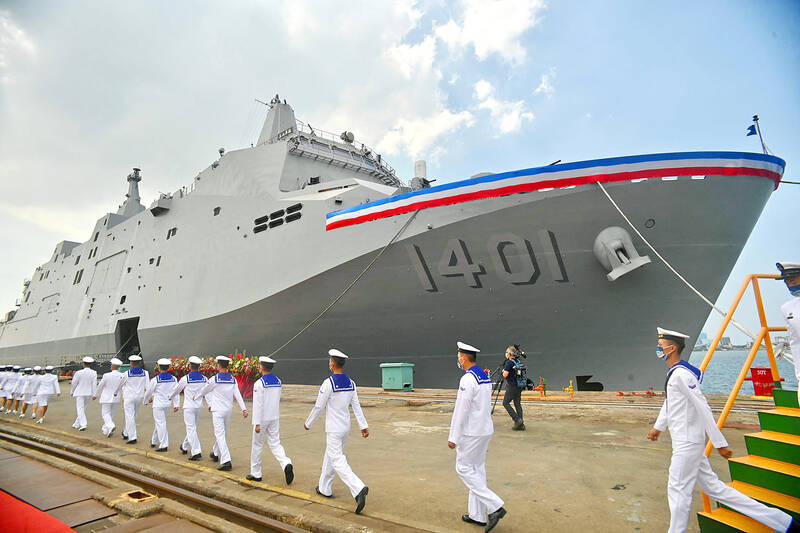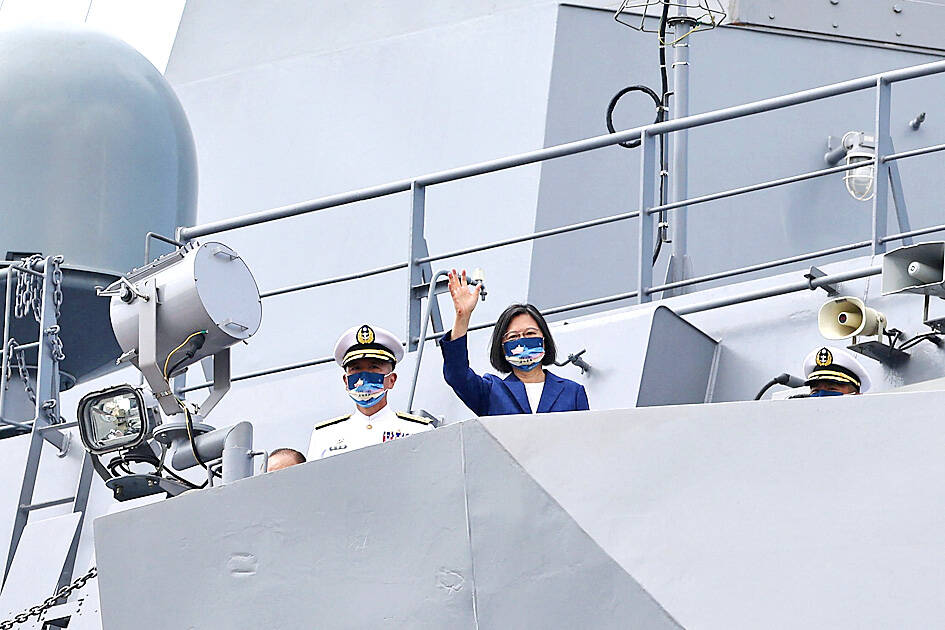The navy yesterday took delivery of the first locally developed and built naval ship of more than 10,000 tonnes in a ceremony in Kaohsiung presided over by President Tsai Ing-wen (蔡英文).
The ROCS Yushan, an amphibious transport dock, was the result of a government-initiated indigenous shipbuilding project seeking to establish autonomy over national defense, Tsai said.
She thanked CSBC Corp, Taiwan (台船), the Chungshan Institute of Science and Technology and the navy for their contributions.

Photo: Sam Yeh, AFP
The military needs the best equipment to uphold peace and defend Taiwan as it faces military threats from China, Tsai said.
The 153m long and 23m wide Yushan has a displacement of 10,600 tonnes and can travel at up to 22.1 knots (41kph), CSBC chairman Cheng Wen-lon (鄭文隆) said.
The ship boasts stealth capabilities and protection against electromagnetic pulse shockwaves, Cheng said.

Photo: Ann Wang, REUTERS
It has one 76mm gun and two Phalanx close-in weapons systems, and is equipped with 32 naval Sky Sword II anti-aircraft missiles, Cheng said.
The armament enables the ship to conduct unescorted amphibious combat operations, Cheng said.
During combat, the Yushan can be used as an amphibious support unit, while in peacetime, it can be used as a disaster relief unit and emergency medical aid station, in line with the navy’s “disaster relief during peacetime, combat duties during wartime” guiding principle, Tsai said.
The Yushan is equipped with five landing craft that can conduct beachhead landings, Cheng said.
The landing craft can travel at up to 21 knots, far faster than the navy initially requested, he said.
The Yushan can carry two high-mobility multipurpose wheeled vehicles or one 15-tonne vehicle, he added.
Tsai said that many navy officers have applied to transfer to the Yushan, showing their readiness to face the challenge of operating the new ship.
“If we have faith, we can overcome any challenges, no matter what they are,” Tsai said.
The navy said the ship is undergoing trials that would help its crew become familiar with its operation.
The ship was in April assigned to the navy’s Amphibious 151st Fleet, given the hull classification of LPD-1401 and welcomed its first captain, Chen Ming-tse (陳明澤), the navy said.

CHAOS: Iranians took to the streets playing celebratory music after reports of Khamenei’s death on Saturday, while mourners also gathered in Tehran yesterday Iranian Supreme Leader Ayatollah Ali Khamenei was killed in a major attack on Iran launched by Israel and the US, throwing the future of the Islamic republic into doubt and raising the risk of regional instability. Iranian state television and the state-run IRNA news agency announced the 86-year-old’s death early yesterday. US President Donald Trump said it gave Iranians their “greatest chance” to “take back” their country. The announcements came after a joint US and Israeli aerial bombardment that targeted Iranian military and governmental sites. Trump said the “heavy and pinpoint bombing” would continue through the week or as long

TRUST: The KMT said it respected the US’ timing and considerations, and hoped it would continue to honor its commitments to helping Taiwan bolster its defenses and deterrence US President Donald Trump is delaying a multibillion-dollar arms sale to Taiwan to ensure his visit to Beijing is successful, a New York Times report said. The weapons sales package has stalled in the US Department of State, the report said, citing US officials it did not identify. The White House has told agencies not to push forward ahead of Trump’s meeting with Chinese President Xi Jinping (習近平), it said. The two last month held a phone call to discuss trade and geopolitical flashpoints ahead of the summit. Xi raised the Taiwan issue and urged the US to handle arms sales to

BIG SPENDERS: Foreign investors bought the most Taiwan equities since 2005, signaling confidence that an AI boom would continue to benefit chipmakers Taiwan Semiconductor Manufacturing Co’s (TSMC, 台積電) market capitalization swelled to US$2 trillion for the first time following a 4.25 percent rally in its American depositary receipts (ADR) overnight, putting the world’s biggest contract chipmaker sixth on the list of the world’s biggest companies by market capitalization, just behind Amazon.com Inc. The site CompaniesMarketcap.com ranked TSMC ahead of Saudi Aramco and Meta Platforms Inc. The Taiwanese company’s ADRs on Tuesday surged to US$385.75 on the New York Stock Exchange, as strong demand for artificial intelligence (AI) applications led to chip supply constraints and boost revenue growth to record-breaking levels. Each TSMC ADR represents

Pro-democracy media tycoon Jimmy Lai’s (黎智英) fraud conviction and prison sentence were yesterday overturned by a Hong Kong court, in a surprise legal decision that comes soon after Lai was jailed for 20 years on a separate national security charge. Judges Jeremy Poon (潘兆初), Anthea Pang (彭寶琴) and Derek Pang (彭偉昌) said in the judgement that they allowed the appeal from Lai, and another defendant in the case, to proceed, as a lower court judge had “erred.” “The Court of Appeal gave them leave to appeal against their conviction, allowed their appeals, quashed the convictions and set aside the sentences,” the judges